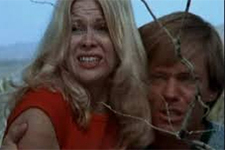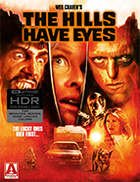The Hills Have Eyes (1977) (4K UHD) [Blu-Ray]
|

Wes Craven's second feature, the gritty, intense desert horror-thriller The Hills Have Eyes, is what his first feature, the notorious The Last House on the Left (1972), should have been. Last House, which was written and directed by Craven and produced by Sean S. Cunningham, who would go on to produce and direct Friday the 13th (1980), is remembered primarily for its extreme, documentary-like torture and violence (the advertising admonished viewers to repeat during the film, "It's only a movie, it's only a movie …"). However, it is also a film that severely hampered by tonal imbalance and moments of utter absurdity and silliness that could not have been anything other than intentional. The Hills Have Eyes, on the other hand, dispenses with awkward attempts at jokiness (with the exception of a few moments of pitch-black humor) and buckles down for a lean, mean portrait of a family of suburbanites meeting their dark double in the desolation of the American Southwest. The suburban family wanders into the wasteland ostensibly in search of a family silver mine, but the reasoning for their presence is largely superfluous. What matters is that they have left the safety of civilization in their station wagon and attached camper and ventured into a realm where civilized rules don't apply. The family is headed by Big Bob Carter (Russ Grieve), a recently retired police detective, and his wife, Ethel (Virginia Vincent). They are joined by their adult son Bobby (Robert Houston); daughter Lynne (Dee Wallace), her husband Doug (Martin Speer), and their infant son; adult daughter Brenda (Susan Lanier); and their two German shepherds, Beauty and Beast. Given that The Hills Have Eyes was made at the dawn of the Carter years and in the fetid shadow of Vietnam and Watergate, the family in is an intriguing portrait of divided middle America, with Bob and Ethel representing the older generation and its brusque, overdetermined masculinity and cowed womanhood and their adult children representing the emergent yuppies, who clearly differ politically and attitudinally from their parents and yet are still well on their way to a life of materialism and consumer culture. After an accident disables their car and leaves them stranded in the desert, the Carters are besieged by a family of vicious, inbred cannibals led by the savage and wild-eyed Jupiter (James Whitworth), who is just as much a domineering paterfamilias as Big Bob (albeit one whose domination of those around him is physical, as well as verbal and emotional). His sons, Pluto (Michael Berryman) and Mars (Lance Gordon), do his every bidding, which at one point involves breaking into the Carters' camper and stealing Doug and Lynne's baby to eat (the very fact that the film makes it entirely probable that the baby will be killed and consumed is testament to how unencumbered it is by mainstream cinematic rules of decency or restraint). By the time all is said and done, one of the dogs has been gutted, a character has been crucified on a Joshua tree and lit on fire, several other characters have been shot and killed, and any hope of survival for the Carters rests entirely on becoming as savagely violent as their attackers. And this is where Craven's film distinguishes itself, at least thematically. Despite being a low-budget, 16mm effort effort written specifically to take advantage of a singular location and a small number of characters, The Hills Have Eyes is an incisive portrait of the thin line between civilization and savagery, a theme that was often taken up by the Western and helps account for why it is often thought of as a modern twist on that most American of genres. Craven had already demonstrated a fascination with the poles of civility and violence in The Last House on the Left, which was a barely disguised reworking of Ingmar Bergman's The Virgin Spring (1960). In that film, Craven shows a respectable bourgeois couple descending into vengeful violence against the gang that murdered their daughter, ending the film on a shot of the blood-spattered and exhausted couple that shows them as clearly defeated, not victorious. Thus, Last House argues that a bourgeois family isn't civilized because it lacks violence, but simply because they have repressed it. The same could be said of the suburban family in The Hills Have Eyes, many of whose members prove to be quite willing and able to do whatever it takes to survive, even if that means using a family member's dead body propped up in a lawn chair as bait. Craven again ends the film on a significant freeze frame, in this case a medium close-up of the aggrieved face of one of the film's "civilized" characters after he has just hacked to death a member of the desert family, which then dissolves into a blood-red screen. The violence in The Hills Have Eyes retains much of its shock value today, even as the relative gruesomeness and gore of contemporary horror films (including Hills' 2005 remake and its 2007 Craven-penned sequel) have far surpassed it. It i |

